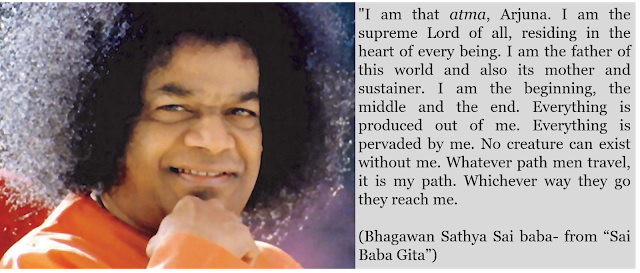Chapter VIII (Continued…)
Verse
19
Bhootagraamah sa evaayam
Bhootwaa bhootwaa
praleeyate; Raatryaagame’vashah paartha Prabhavatyaharaagame.
This
same multitude of beings, born again and again, is dissolved, helplessly, O
Arjuna, (into the unmanifested) at the coming of the night, and comes forth at
the coming of the day!
Verse
20
Parastasmaat tu
bhaavo’nyo’vyakto’vyaktaatsanaatanah;
Yah sa sarveshu
Bhooteshu nashyatsu na
vinashyati.
But
verily there exists, higher than the unmanifested, another unmanifested Eternal
who is not destroyed when all beings are destroyed.
Verse
21
Avyakto’kshara
ityuktastamaahuh
Paramaam gatim;
Yam praapya na nivartante
Taddhaama paramam mama.
What
is called the Unmanifested and the Imperishable, That they say is the highest
goal (path). They who reach It do not return (to this cycle of births and
deaths). That is My highest abode (place or state).
Verse
22
Purushah sa parah paartha
Bhaktyaa labhyastwananyayaa;
Yasyaantahsthaani bhootaani
Yena sarvamidam tatam.
That
highest Purusha, O Arjuna, is attainable by unswerving devotion to Him alone
within whom all beings dwell and by whom all this is pervaded.
Verse 23
Yatra kaale twanaavrittim
Aavrittim chaiva yoginah;
Prayaataa yaanti tam kaalam
Vakshyaami
bharatarshabha.
Now
I will tell thee, O chief of the Bharatas, the times departing at which the
Yogis will return or not return!
Verse
24
Agnijyotirahah shuklah
Shanmaasaa uttaraayanam;
Tatra prayaataa gacchanti
Brahma brahmavido janaah.
Fire,
light, daytime, the bright fortnight, the six months of the northern path of
the sun (northern solstice)—departing then (by these), men who know Brahman go
to Brahman.
Verse
25
Dhoomo raatristathaa
krishnah
Shanmaasaa dakshinaayanam;
Tatra chaandramasam
jyotir
Yogee praapya nivartate.
Attaining
to the lunar light by smoke, night-time, the dark fortnight or the six months
of the southern path of the sun (the southern solstice), the Yogi returns.
Verse 26
Shuklakrishne gatee hyete
Jagatah shaashwate mate;
Ekayaa yaatyanaavrittim
Anyayaa’vartate punah.
The
bright and the dark paths of the world are verily thought to be eternal; by the
one (the bright path) a person goes not to return again, and by the other (the
dark path) he returns.
Verse
27
Naite sritee paartha
Jaanan yogee muhyati
kashchana;
Tasmaat sarveshu kaaleshu
Yogayukto bhavaarjuna.
Knowing
these paths, O Arjuna, no Yogi is deluded! Therefore, at all times be steadfast
in Yoga.
Verse
28
Vedeshu yajneshu tapahsu
chaiva
Daaneshu yat punyaphalam
pradishtam:
Atyeti tatsarvam idam
viditwaa
Yogee param
sthaanamupaiti chaadyam.
Whatever
fruits or merits is declared (in the scriptures) to accrue from (the study of)
the Vedas, (the performance of) sacrifices, (the practice of) austerities, and
(the offering of) gifts—beyond all these goes the Yogi, having known this; and
he attains to the supreme primeval (first or ancient) Abode.
Hari Om Tat Sat
Iti Srimad
Bhagavadgeetaasoopanishatsu Brahmavidyaayaam Yogashaastre Sri
Krishnaarjunasamvaade Aksharabrahmayogo Naama Ashtamo’dhyaayah
Thus,
in the Upanishads of the glorious Bhagavad Gita, the science of the Eternal,
the scripture of Yoga, the dialogue between Sri Krishna and Arjuna, ends the
eighth discourse entitled:
“The Yoga of the
Imperishable Brahman”
Love.
